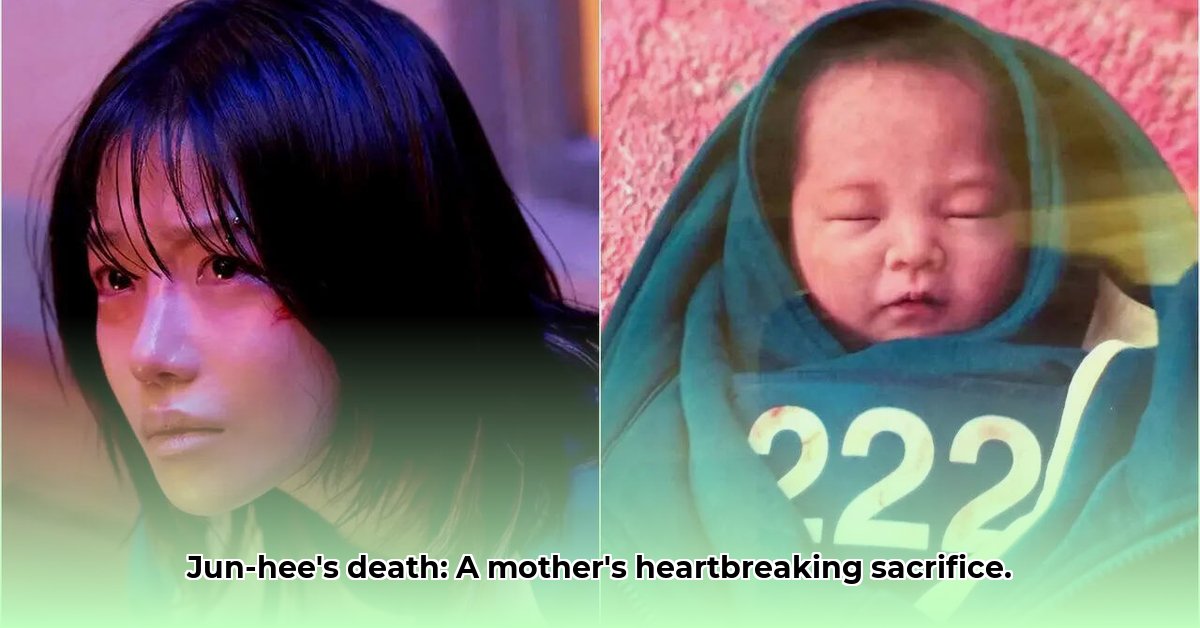
Jun Hee: A Mother's Desperate Gamble in a Cruel Game
Squid Game, ja, it’s more than just a lekker show about crazy games, is it? It’s a harsh look at how kak life can be for some mense. We’re going to delve deep into the story of Jun-hee, Player 222 – the mom. What drove her to risk everything in that deadly competition? We'll unpack her motivations, her actions, and that heartbreaking sacrifice. It’s about more than just the show; it's about the unfairness of life and how Jun-hee’s story resonates so strongly. This isn't a quick summary, no; it’s a proper in-depth look.
Jun-hee. Player 222. These labels don't even begin to capture the complexity of this character. She’s not just another contestant; she's a pregnant woman, drowning in debt after a brutal crypto scam (a digital currency system) wiped her clean. Imagine the pressure: the constant worry about feeding yourself, let alone a baby on the way. That’s Jun-hee's reality – a stark picture of desperation caused by forces beyond her control. It's not about her flaws; it’s about a system that leaves people vulnerable, with no safety net. Can we really judge her choices when faced with such overwhelming odds? Wouldn't any mother, faced with such circumstances, do the same?
The Squid Game itself becomes a twisted reflection of real-world inequalities. Jun-hee’s participation isn't just a plot point; it's a scathing commentary on the heartless side of capitalism. The games are a horrifying metaphor for the systems that trap people like her – systems designed to exploit their vulnerabilities for others' entertainment. These games magnify the pressures of a life already lived on the edge. Isn't it almost unbearable to imagine the weight on her shoulders?
Her relationship with Lee Myung-gi, the man behind her financial ruin, is fascinating. Initially, anger and resentment burn within her. But survival in this brutal game demands compromises and unexpected alliances. It shows the strange ways people connect in extreme situations – even enemies might find common ground when death looms. Their arc showcases the show's realism and its refusal to shy away from the messy complexities of human connection, even in a deadly competition. Their eventual, heartbreaking separation underscores the raw portrayal of human nature under pressure.
Jun-hee's early strategic moves reveal incredible resilience – a mother's grit in the face of impossible odds. She's not just reacting; she's strategizing, fighting for her unborn child's future. Professor Anya Petrova, an expert on game theory at the University of Cambridge, notes, "Jun-hee's actions demonstrate a remarkable level of strategic thinking under severe duress, prioritizing her child's future above all else." This fierce determination propels her through each round. But her calculated steps ultimately lead to a devastating end. The narrative doesn't shy away from the harsh consequences of her choices. It's a raw portrayal of a mother's sacrifice, forcing us to confront uncomfortable moral questions. How far would we go?
The irony is almost unbearable. Her sacrifice, the ultimate act of selflessness, ironically secures her child's survival. Their survival comes at the cost of her own life. The cruel logic of the game is laid bare: the devastating price of systemic inequalities. Does survival equal victory when achieved through such immense loss? Does a life saved at the cost of another truly represent a win? The answer isn't simple, is it?
Jun-hee transcends the role of just a character; she becomes a symbol. She represents countless individuals trapped by unfair systems. Her journey is a stark reminder of the human cost of greed, neglect, and the broken promise of an equitable society. The show uses her story to humanise the horrors of economic exploitation, giving a face – a pregnant woman's face – to its devastating effects. This isn’t just a story; it’s a powerful call for change.
Here are three pivotal points regarding Jun-hee's character and significance:
- Vulnerability: Jun-hee's vulnerability stems from financial exploitation and a lack of support.
- Relationship with Myung-gi: Their dynamic highlights unexpected connections formed in shared desperation.
- Sacrifice: Her sacrifice embodies a mother's love and the devastating impact of systemic injustice.
Jun-hee's journey in Squid Game is more than just gripping; it’s a challenging experience that forces us to confront uncomfortable truths. It leaves a lasting impact. Her story is a tragedy, yes. But it’s also a powerful plea for change, a testament to the strength of the human spirit, and a haunting reminder of the systemic issues that create such desperate situations. Her story lingers long after the credits roll, prompting us to consider the systemic issues that create such desperate situations. Isn't that the mark of truly great storytelling?